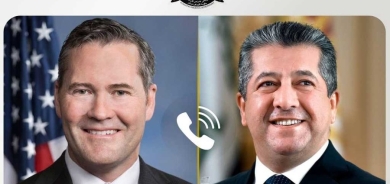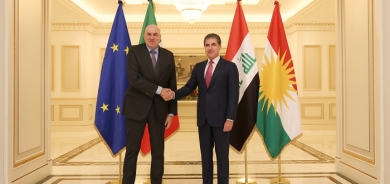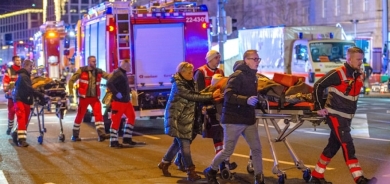Steven Zunes to Gulan Magazine: It is unfortunately that many parts of the Middle East are heading in a more democratic direction; see Iraq retrenching into more old style authoritarianism
November 15, 2011
Exclusive Interviews

The Professor Steven Zunes is a professor of Political Sciences and International Relations in San Francisco University, and he is also a specialist on the Middle Eastern and the Iraqi political issues. The Professor Zunes is a world-widely famous analyzer. Regarding to the current situations in Iraq, we thought it would be necessary to address few questions to the Professor Zunes. And with great appreciations to the Professor Zunes, he expressed his opinions and views in an exclusive interview to Gulan Magazine regarding to the topic we are interested in as the following:* With the approaching to the US withdrawal time period, self-attack and explosions have increased in Iraq which are obviously signs that Iraq’s security situation is still not stable enough so as to let US troops to withdraw. According to your opinion; don’t you agree that the withdrawal of US troops further endangers security situation of Iraq?
“Because their expertise in counter-insurgency and counter-terrorism, the withdrawal of the US Troops indeed increases the likelihood of further terrorism and violence. On the other hand; the presence of the US Troops in Iraq has helped stirrup the kind of nationalism and extremism that has given some of the terrorist groups recruit. So; it is possible that it have the opposite as well, it is really hard to judge.
Unfortunately; the way the current government came to power has created a kind of factionalism that’s makes a cohesive of representative government impossible
* After the 2010’s elections, which has almost been 2 years, the Iraqi government hasn’t been shaped completely and there are still obstacles which haven’t been resolved. So, in your view please; how the Iraqi politicians can run the country while they haven’t been able to shape the government within two years?
Unfortunately; the way that the current government came to power has created a kind of factionalism that’s makes a cohesive of representative government impossible. Dictators which have been overthrown through popular nonviolent movements, likely as seen in many parts of the world are able to generally create more stable democratic system, because there was participation in the very beginning because there was giving and take because there was compromise. However; when you have a dictator overthrown in a foreign invasion without the sort of organic processes of democratization, you end up with factions mainly which have armed militias, and they are not interested in compromise, and are more interested in imposing their will on the others and enforcing their agenda without any sort of nominally maybe an elected government the process is not a democratic one, but one of the recruited power politics, and that is really what made the Iraqi government so dysfunctional.
Unfortunately; Maliki represents a kind of an autocratic style of Arab politics which has been challenged in Tunisia, Egypt, Syria, Yemen, Bahrain, and in other countries
* According to the comments made by many of the political parties in Iraq; Dr. Maliki, the Iraqi PM, is heading toward autocracy and dictatorship. So, if the Iraqi PM continues his attempts and returns to dictatorship, what happens to the political future of Iraq?
It is serious problem; we witnessed the assassination of intellectuals and journalists and others who have been support the civil society. Most Iraqis are not sectarians, and most Iraqis want to believe in democracy, most Iraqis want to have a system where the political differences can be workout through nonviolently means, not through decree, and not by elites, not by armed militias and not by death squads and terrorism. Unfortunately; Maliki represents a kind of an autocratic style of Arab politics which has been challenged in Tunisia, in Egypt, in Syria, in Yemen, in Bahrain, and in other countries, that people throughout the Middle East are trying to say “This is not the way the government should run.” And it is unfortunately that many parts of the Middle East are heading in a more democratic direction; see Iraq retrenching into more old style authoritarianism.
Clearly; Iran and Turkey, rightly or wrongly, will going to use the armed group that are based inside of the Iraqi Kurdish Territories as an excuse for this kind of interventions
*There are some suspended problems between Kurds and Federal government in Baghdad, the most important one among them is the problem of disputed territories. Observers think that these problems are going to be more complicated. So, if the tension increases, how far there will be the risk of civil war to take place in Iraq?
Indeed the Kurdish question as I believe is the most dangerous potentially, also the differences between Arab Sunnis and Arab Shiites and other divisions within the society, we are talking here about the basic right of self-determination. This situation really does need to be resolved, and so far; there has been no really attempt for resolution, it has been more sort of putting things off, and maybe doing a little bit of minor compromise here and there, but the underlying issues are not really being addressed. And unfortunately; the United States which many times had been supporter of the Kurdish cause, is not being that supporter, it maybe seen yet again as we seen several times in recent history when the United States made promises in return for Kurdish support, and then turned around and abandoned them. The United States did not been doing, and never done much really to protect the Kurds; we remember the large-scale incursions by Turkey back in the 1990s, when the Kurdish Region of Iraq was suppose to be a safe haven, declared by the United Nations; and yet the United States had no objections what so ever as the Turkish incursion in fact, the arms used by the Turks were from the United States. So; I don’t think that the presence or absence of the US Forces in Iraqi is going to make that much of different in terms of security situation for the Kurdish areas in Iraq. Clearly; as long as Iran and Turkey believe, rightly or wrongly, that there are armed group that are based inside of the Iraqi Kurdish Territories they will going to use it as an excuse for this kind of interventions, and unfortunately; it is likely to continue.
* Last Question: Many observers think that; if tension re-occurs in Iraq again, it will be difficult to have the different components of Iraq, Kurds, Sunni and Shiite, being able to live together. So, how far do you see the probability that Iraq may collapse just like the former Yugoslavia?
I think that things improved a little bit in this regard. I think that the younger Iraqis are really tired of this kind of sectarianism, tired of this division, and tired of this kind of dividing rules that you have. The biggest divisions I think within the Arab Part of Iraq are not between the Sunnis and Shiites, are rather between sectarian and nationalists within those communities. And so; I really think that as part of the broader you awakening as seen into democracy, as seen in the Middle East, I am hoping will stretch for Iraq both in terms of demanding greater democracy, as was saw in Egypt; when you had protesters saying that Christians and Muslims “we are one” where different people were working for democracy. And in Bahrain, despite the efforts of the monarchy that effect for democracy to struggle as Shiite sectarian, they were Shiites and Sunnis all saying “We are Bahrainis”. I think that the more that civil society can be empowered, I think more ordinary people, and not these leader politicians, can be the main actors. I think the more we have a democracy from the grassroots, the less likely there going to have kind of the sectarian divisions that once again punch the country into a civil war.”
Transcription: Qane’ Kakeiy















